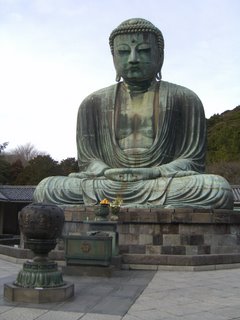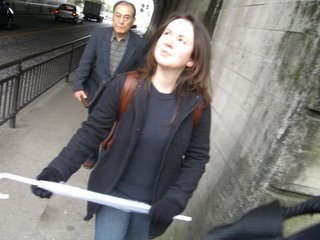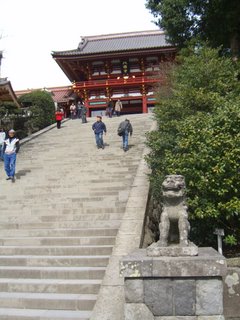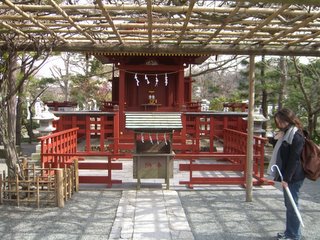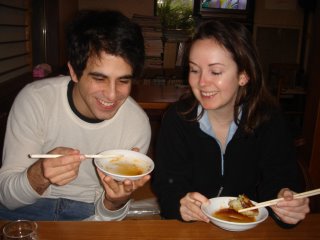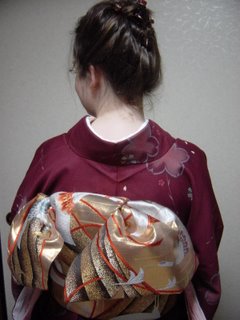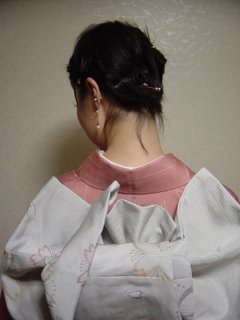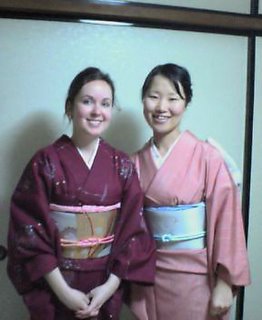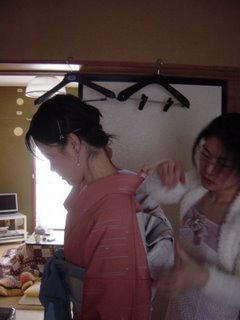27 March 2006
Most Beautiful Tanka...
A day will come
when my eyes
no longer see.
To me my husband whispers,
"It will be alright."
--T.K.
Back to Japan
Indeed, nothing has remained the same. Some things are predictable, but still different. Early morning frost has been replaced by cherry trees in full bloom. The blossoms, which were pink buds only a few days ago, are now white flowers with all the grace and fluffiness of giant snowflakes. When I look into a cluster of cherry trees, it's like looking into a freeze-frame snowfall -- the kind with fat, feathery flakes that seem to build resistance and slow down as they float to the earth.
I ran into a plump brown lizard yesterday. I haven't seen any of these guys since you could sweat just resting in the shade. The lizard startled me so I yelped, but then I laughed, because his presence could only mean one thing: heat is coming! He stuck his pink tongue into the air as a greeting, then dove into the nearest ditch.
So spring is coming, but it's not quite warm. This means that my camera batteries won't stay charged, because my apartment is still too cold. But as soon as possible, I will take cherry blossom photos to share.
For the first time since summer, I have no work to accomplish at school. I can get a head-start on some lesson plans, but there is no need. If I get a head-start on work now, there will just be more free time in the future, free time that I would appreciate filling up with work that I have not already completed. The other teachers are busy--not everyone is sitting around with as much free time--but since I am an ALT, I don't have as many responsibilities. I will actually be glad when spring vacation ends, and I can once again fulfill my purpose of being an English teacher. (But have no fear, I am finding plenty to do in the "free" time. I don't allow myself to stay bored all day.)
In other news, the teacher changes are officially complete. Mayumi and Jun are gone, which makes me sad. They will return on Thursday for a teacher party and a final goodbye. Then the desks in the teachers' room will be rearranged, and a new school year will officially begin, complete with new staff.
It occured to me this morning, as it has many times before, just how small your world can be. No matter how many things you learn, or how many places you go, your world will always be as big or as small as you make it. When classes aren't in session, my world at work consists of set patterns and routes and routines. I thought this while washing my hands in the teachers' room. There are 2 sinks, but I always use the same sink. I use the exact same sink and wash my hands the exact same way, every time. I'm in Japan but sometimes your world can be only so big. I thought the same thing when I was in Paris on the metro: "I ride the exact same route to the university every day; I see the same strangers and I recognize the same people who take the same route as I do. I have come all the way to Paris, but in many ways, my world can stay so small." Funny, isn't it? Expansion doesn't happen without a conscious effort.
This weekend I'm going to a concert with Mayumi in Nagoya. Yay!! Then I'm going to a hanami party (cherry-blossom-viewing festival) with a few other teachers. The batteries will be charged by then, so I hope the blossoms will still be there for me to photograph!
Camping in Japan
Top 10 Reasons Why Living in Japan is like Camping
10. Garbage must be carried with you wherever you go.
9. Inside and outside are the same temperature.
8. Cooking is done over an open flame.
7. Raingear is brought everywhere.
6. The neighbors hear and see everything you do.
5. The neighbors invite you over for a cold beer.
4. You sleep on the floor.
3. The floor is made of grass.
2. Bugs, bugs, and more bugs.
1. The Squatty-Potty.
Honorable Mentions
- BYOTP - bring your own toilet paper
- the large variety of meat on sticks
- like a campfire, people huddle around a kerosene heater
- laundry is air-dried for all of the neighbors to see
24 March 2006
The Feminine Mystique
--Betty Friedan
1963 and again in 2001
22 March 2006
Mc, Wal-, Star- -- Did I Stutter?
Japan is definitely a consumer culture. What is "cool" to buy runs the gamut, but usually the more Western and "exotic" something is, the better. McDonald's is still a little too fatty for Japanese taste, but you can hardly find a place to stand in a Starbucks. It's always packed.
Now, what about picking and choosing your franchises? I haven't set foot in a McDonald's, but I have gladly walked into these crowded Starbucks, a place I would not be caught dead if the country had its own good coffee (Italy, France, etc). So if I'm pissed about the Wal-Mart in China, but relieved to stumble across a Starbucks in Shizuoka, does that make me a hypocrite?
Evidently, picking and choosing is not a good idea, because you can pretty much guarantee that if you're sitting in an American-owned franchise, somebody somewhere wants to bomb it - even in Japan. I couldn't help but question my appreciation of Starbucks, a decidedly Western space with a Western feel in an Eastern land, when I read a tiny sign in the bathroom one day (see below - I was so struck by the clear but delicately-implied message that I got out my camera and took a photo of the sign.) But as for my new-found appreciation for Starbucks.... Could that nostalgia for America, for Western atmosphere, even my poorly-sated nostalgia for a Parisian cafe, one day cost me my life? What if someone decided he hated Starbucks as much as he hated America?
The difference in consumer culture in Japan and America boils down to a lasting gift from our founding fathers - Puritanism. Maybe I speak too much about myself here, and what I say can't be generalized for fellow Americans. But after shopping with Japanese friends, I noticed a difference. They buy the thing, revel in their newfound happiness, and then move on. Whoo, an accomplishment, isn't purchasing power great. I buy the thing, revel for a few minutes, then move on to an inevitable cycle. Yeah, this is great, but it doesn't change my reality at all; it doesn't define who I am; it doesn't make me more capable or smarter or more beautiful; it doesn't make me more fulfilled, don't I know not to put that much stock into a thing? into a luxury? If I get too excited about this, it will just make me feel empty, because it doesn't fulfill any kind of real need. Gee, I should be ashamed for even getting excited about this in the first place. In fact, I might even be a better person WITHOUT this thing. It just adds to the clutter.
Case-in-point, pre-purchase: one day I was shopping with a friend. I was looking for a new sweater, which I found almost immediately. It was expensive but it was comfortable, sexy, fit perfectly, and looked unlike something I could find in GAP or the usual places. I bought it. Ah, a brief moment of satisfaction and excitement as I daydreamed about donning my new purchase.
But my sweater only caused my friend grief. "Oh, I need something," she said. "What are you looking for?" I asked. "Well nothing in particular, but you got something, so now I just NEED something. I want to buy something too." Was she kidding me? That blatant, blind desire to buy something for the sake of buying something wouldn't pass in America. Maybe I'm an oddball or maybe I hang out with weird people. But I couldn't believe my friend was saying that with no trace of guilt or shame. Even if the thought had crossed my mind, I never would have shared it aloud. I think the major reason for this is the complete lack of Christianity in Japan's history. (And currently, only about 2% of Japan is Christian). There are no Christian or Puritan values. (One of the strangest things about Japan for me is the obvious lack of "rest" on Sundays.) The reason Japan is so easily a consumer culture, why this tiny country "boasts" the highest Louis Vuitton market in the world, is the same reason abortion is often a perfectly acceptble method of "contraception." Japan does not distinguish between a "baby" and a "fetus," yet there are no moral consequences to terminating a pregnancy. The birth control pill was introduced only recently, and I have yet to hear of any woman actually interested in using it. Why dump your body full of "unnecessary" hormones when the problem is easily solved by abortion?
From Wal-Mart to abortion in one post? I must have been pissed off for a while.
Disclaimer: I am not against abortion.
For some reason I had trouble uploading the Starbucks bathroom photo, which is of a sign that reads, "Please let our staff know if you see any suspicious packages."
11 March 2006
Spring
But the real testament to the coming of spring is that the bugs are back.
07 March 2006
Life Lessons, Love Lessons
What I learned in Japan is totally unrelated to romance, but hugely applies. (Hugely, it's a word now, for all blogging purposes). When I first came here I was totally illiterate, I had no car, and I didn't know about the local transportation. I have never needed anyone else so much in my life.* I needed help grocery shopping, getting anywhere, creating hot water for my shower, using the crazy public restrooms, reading labels, understanding the train schedule....EVERYTHING. At first it was a huge cause of frustration because I hate feeling helpless or dependent in any way. But let me tell you, if you try to live in Japan but can't speak Japanese, you have no choice but to suck up your pride, because you can't do things alone. This is because you are illiterate, and because Japanese society is built to make everyone need everyone. So never in my life have I needed other people like I have here.
What I realized is that, despite needing so much from other people who owe me nothing, they still loved me. I needed them but that didn't make me unworthy of their care. It didn't make me needy or annoying or a drag. This was a major change and understanding that I never expected to gain from my experience in Japan -- that you can need so much, and be given so much, and eventually find a way to give back while still receiving, so you discover a balance. And I think that balance will pave the way for all kinds of amazing relationships.
* This discussion completely excludes my family and especially my parents, because it is taken for granted how much love and support--both emotional and financial--I have needed from them. My family has been there from the start, so needing them was not something I had to learn, it was simply innate. To really need friends and significant others, however--this has taken a lifetime of lessons.
Guest Blogger: Chris Manz
written by Chris Manz
edited by yours truly
So, I went to New Jersey today and came back via the Port Authority. Now, the L is down yet again, so I needed to take the ACE to the JMZ, then get a shuttle to where I live. Not so bad. It began strangely when there was a D train running on the ACE line, but no matter, I took it anyway. Then in the middle of the ACE line, the D train--which was pretending to be an A-- decided to become an F train, for no apparent reason. Unusual, but not a big deal for me, as it was still going where I needed it to go. Things would only get more interesting when the poser F train decided to stop little more than halfway across Manhattan, making its last stop at a station where there were no other lines. And it stopped on the uptown side of the tracks. After crossing to the other side of the station, I waited for a real F train to take me one stop further, which is all I needed, and waited for quite a while, staring at something that resembled a tusk from a decent sized cat, or perhaps really large rat. But the train eventually came before I could figure out exactly what it was. As we crossed over the Williamsburg bridge into Brooklyn, there was a somewhat crazy woman sitting near me. She was seated next to a man (who I think was with her) when she proceeded to stick her pinkie in her ear and shake it vigorously. Then she pulled her pinkie out slightly and whisked the air toward the man, as you might have done as a child, when you farted and wished to blow the foul air towards someone else. Lovely imagery. I made it to brooklyn only to get on a bus with a bus driver who resembled a cross between Matt Dillon (who I always thought was kinda creepy) and the main guy from Fear and Loathing in Las Vegas, with a thin moustache of the former and the "I'm tripping on acid" look of the latter. I wanted to put on a seatbelt, but alas, there was none. All of this occurred as I was transporting a backpack full of brownies, chocolate chip cookies, and a delicious roast beef, compliments of my dear aunt.
Waiting for Moss
I’d spent a packed weekend with other teachers playing volleyball, eating a gluttonous steak dinner, and squealing out multiple hours of karaoke. In the prefecture-wide volleyball tournament I injured my thumb; at the steakhouse I was the only one who chose steak instead of hamburger and potatoes instead of rice; and in the karaoke room, only four songs in four hours were sung in a language I could understand. Yet when the pictures were developed and circulated through the teachers’ room, I smiled inwardly at the undeniable expression on my face: in this place so far away from home, I was happy.
With little time to recover after a busy weekend, Monday was challenging. The third-year students were preparing for college entrance exams. With test day looming, they wrote short English compositions that I was responsible for correcting each day. The afternoon was spent with my good friend and fellow English teacher, Mayumi, as we struggled to come up with a grammar rule that explains why you can say “this summer” and “in summer,” but not “in this summer.” My grammar knowledge is strong, but as a respected language teacher you must limit the use of “because it sounds right” as a satisfactory explanation.
By that evening I needed to unwind alone, outside of my apartment. I wanted a coffee-shop atmosphere, but as I live among tea fields in the suburbs of Fuji, Mos Burger was my best bet. It was a rare occasion and I decided Japan’s native fast-food chain, along with a good book, would help me relax.
I ordered oshiruko, a sweet, red bean soup with rice cakes, and pulled out a novel. A few minutes later, two uniformed girls plopped down in my booth. I looked up to greet them with a shocked face – I was amazed they sat down without even speaking to me first. Usually young students are too shy and polite to approach with such nonchalance. But in Mos Burger the girls were more willing to speak English, as if being off school property gave them more leeway to make mistakes. We had a great discussion about pet rabbits, cram school, and traveling in Australia. It was a special opportunity to know the students better, without a list of rote phrases for them to memorize.
The girls downed their burgers quickly before biking to cram school. We said goodbye and once again I was alone with my book. About two hours later, I felt someone staring at me. So many people stare outside of Tokyo that I didn’t take notice, until the man did something no stranger had done before: he spoke to me, in English.
“Excuse me, may I talk with you?” the man asked politely. He was a fairly attractive, middle-aged businessman. In his tailored, expensive suit, he looked out of place behind a burger wrapper and a crinkled paper cup. I realized that he finished eating some time ago and had been staring for longer than I thought.
My reaction to strangers who approach me unsolicited is to totally reject them, especially if I am alone and the stranger is male. I’ve never felt unsafe in Japan, but I’m not one to throw such caution to the wind, so I was annoyed and nervous when this man spoke to me. Who cares how nice or affluent he looked? I’m a young, single female; can’t he see that I’m alone? How rude of him to put me in this uncomfortable situation. His language skills were far too advanced for the “I just want to practice my English” excuse.
“Actually, I have to finish this,” I said, pointing at my book with urgency. I made my expression as pained as possible. “I’m sorry.”
“Oh, I see,” he responded, looking incredibly disappointed, and worse, lonely. Turning back to my book, I started to feel guilty.
Guilty! Why did I feel guilty? I began to rationalize. All the kindness you have been shown by strangers in this country, and you can’t even speak to this man in a well-lit, public place. Maybe he looks lonely for a good reason. Maybe he was just trying to add a little variety to his boring night at Mos Burger. Maybe you should put down the book and talk to him. Besides, your bus comes in 30 minutes, so you have an excuse to leave.
I looked up at him then, debating whether or not to get his attention after turning him down. But soon the man glanced back at me, made eye contact, and said, “May I just ask you one question?”
So I agreed, and ended up having a very pleasant, entertaining conversation with this man who had just moved from Tokyo. He missed the big city, and he was bored. Although he had never lived abroad, his English was superb and he was obviously an intelligent, well-spoken man. Towards the end of the conversation he asked my name. The fact that he never asked for my contact information made me feel safer. So I told him my name was Lauren, and then I sang a tune just loud enough to reach his ears. Japanese people tend to pronounce my name like “rolling,” and during more than one introduction, men have burst into song with, “Rollin’ rollin’ rollin’, rawhide!” When I sang the chorus I was hoping to make this man laugh. But instead, he seemed quite serious, almost sad, and said,
“What does that mean, anyway, “rolling”? I know it means moving on…” he made a forward-rolling motion with his hands. “So that must mean you have a wandering spirit – never in one place for too long.” And for only the second time, he looked straight into my eyes.
I didn’t say anything but just smiled at him. I felt oddly exposed after his comment, as if he’d unexpectedly pegged my character 20 minutes into the conversation.
“Wandering spirit,” I repeated. “Yes, maybe so.” While the idea made me happy, it only seemed to make him sad.
In my experience, the Japanese barely express their emotions in public, much less to someone they hardly know. The secret is to watch their eyes. Even if they don’t make eye contact, you can gather a lot of information not only from inside them, but also from around them; for many Japanese people, stress or sadness will show in the fine, delicate skin above the cheekbones. And I could see, just barely, that his muscles tensed when I said that.
Much later, I remembered a conversation I had with Mayumi. We were running through a temple garden like children, excited by the discovery of such a beautiful place so close to our school. The grounds were green and lush even in winter, fed by water that trickled down from the clean snow atop Mt. Fuji. Bright green moss fell over the smooth stones like a long velvet gown.
“Look,” I demanded. “It’s so beautiful.”
“Mm-hmmm,” Mayumi agreed. Then she knitted her brows. “Don’t you say, ‘A rolling stone gathers no moss?”
I smiled at her and laughed as the peaceful landscape blurred with my visions of Mick Jagger and that huge red tongue.
“Right,” I said, returning my attention to the green fuzz.
“That’s one example of how our cultures can be totally opposite,” she pressed. “You think it’s good to keep moving, because gathering moss means you’ve been in one place for too long.”
“Yeah,” I blinked. “Moving is adventure, and adventure is exciting.”
That movement is a crucial exercise of freedom. At least, this is my Americanized, individualist point of view. Leaving everything behind to live someplace new was in large part why I came to Japan. My main goal was to learn more about Japanese culture – what motivates these kind and generous people in a world so different from—yet so connected to—my own. But the other reason I came to Japan was because I didn’t have to stay in America. I had to take advantage of that freedom, so I accepted the challenge, and I moved to a strange new country.
Every day I try to appreciate the immense privilege it is to be here: to step inside another culture and immerse myself in a different world, all the while knowing that I possess a very special trait perhaps Japanese people do not: if I start to gather moss, I can choose to roll. I can leave Japan for another place the same way I left my home for Japan. As a JET participant, this is ultimately what distinguishes me from others in this country. Most JETs come knowing they will leave in one to three years.
Many times I’ve thought that I could settle in Japan, because I’m happy enough to consider it a home. And many times my friends in America have asked me, “How do you do it? How did you pick up and move to this place where you knew no one, where the customs were different, where the food was unfamiliar? You’re so brave.”
Perhaps the strength to jump into something new comes from the knowledge that I can choose to leave it. And I ask myself, is this actual bravery? Have I really earned a badge of courage? The rolling stone may seem impressive, but the truly courageous rock is the one that gathers moss. This was never as clear to me as when I sat in zazen (Zen meditation) at the same temple. With a modest knowledge of Zen Buddhism and a far cry from any stage of Enlightenment, I learned something during meditation that might have never occurred to me otherwise. My third time sitting in zazen, I finally noticed a pattern. Very soon into the meditation—indeed, within the first three minutes—I would begin to panic. The temple interior was quiet, the monk was kind, and the rain outside was soothing; yet in those initial moments of sitting still, my heart rate would increase, my breathing would become labored, and my head would scream with the desire to wiggle, shift my weight, clear my throat, scratch my nose – anything to move. It had nothing to do with comfort, for I could sit another twenty to thirty minutes without any lasting problems. On the contrary, it had everything to do with a fear of sitting still. I feared the chains of immobility and the (albeit temporary) suspension of freedom; I feared time moving too slowly and even stopping; I feared that thirty minutes would become an eternal commitment I could not escape…in short, I feared I would gather moss. Surrounded by old stones who couldn’t speak my language, one of them carrying a large stick to whack anyone who moved, I had no choice but to accept it, and sit still. Eventually I could simply watch the panic rise in me, knowing that it would subside, and that sitting still would later bring a deep sense of peace.
Before I could make this connection, however, Mayumi had to teach me something.
“In Japan, we think the moss is beautiful. We have the same expression, but with a completely opposite meaning. We also say ‘a rolling stone gathers no moss.’ But we want the moss. If you never stay in one place, you’ll never grow any. Sometimes it’s good to be still.”
I gazed at the stones, lost too deeply in her words to respond.
I thought moving to Japan required courage, and to a certain extent, this is true. But perhaps the real test will come when I leave Japan, when I commit to a career and a place, perhaps a significant other, and choose to settle. Then I must forge a lifestyle to incorporate the wisdom gained from rolling down foreign soil and from gathering moss elsewhere. Perhaps that part of life will be more painful than sitting in zazen – but I hope that it will be equally rewarding.
It wasn’t until much later, relaxing at an onsen, that it occurred to me why my “rolling” joke may have dampened the Japanese man’s spirit. Maybe he was hoping I would just sit still.
05 March 2006
01 March 2006
Dan's Visit
22 February 2006
Language Skills
But yesterday that changed a little bit. Hattori Sensei, the librarian and tea ceremony manager, asked to show me something in her office. It was a children's book about being grateful for the little things in life. Hattori Sensei bought the book for her grandchildren but thought I could read it, too. The illustrations were adorable, and I looked up from the cover to smile at her with pity. I could just imagine her disappointment when I'd sit down to read and wouldn't understand a thing.
But I pretended everything was fine and sat down with her anyway. I cracked the cover, admired the pictures, and stumbled through the foreign syllables. Reading outloud was a slow process. Slow like the ice in my chest that melted and the joy that grew up in its place when I realized I could understand the book. I tip-toed through Hiragana and said thank you to the sun, the flowers, kitty cats, moms and dads, zoo animals, and the night sky...and I was so grateful to Hattori Sensei for simply showing me that I could do it.
After that small milestone she suggested I start a journal in Japanese. She offered to correct my mistakes and teach me new verbs and phrases. "Is she crazy?" I thought. "I don't know enough to write a journal." But again I smiled and told her I would do it. Her offers to help me were really generous so I didn't turn her down. I still thought it was impossible though.
Today I bought a small notebook and wrote my first entry in Japanese. I'm sure it's riddled with mistakes, but the message was solid, and once again I was surprised -- I could say more than I thought:
Today I'm excited because my friend is coming from America. He is a friend from my university. Now he lives in New Jersey.
Yesterday Iizuka Sensei gave me a small speech about how instant soup is bad for your health. This is disappointing, because instant soup is good and cheap, and I eat it almost everyday.
Not bad, eh? Then I decided to keep up my French while I'm at it, so I flipped the page over and wrote the same thing in French, with a little elaboration. I think this will be great practice and a great way for me to learn. Thank you, Hattori Sensei.
21 February 2006
DAN IS COMING TO VISIT!
-eat lots of traditional Japanese food, visit neighborhood restaurants, look for Mt. Fuji through the unseasonal rain and haze, etc.
-come to school and learn about the tea ceremony
-visit a temple and sit in zazen (meditation, but if there's another monk with a stick, Dan's on his own and I'll be reading in the next room - fair warning)
-go to Tokyo and see as much as possible
-go to Kamakura and see the big Buddha and the bamboo forests
-go down the peninsula/coastline to Ohito to visit an onsen and another favorite traditional restaurant
-free day....
Whoo hooo!!!!
And right after all this, I return to school for the graduation ceremonies and lots of exam-grading...but no one's thinking that far ahead.
Dan I hope you get here no problem.
14 February 2006
Food & Fat
In general (IN GENERAL), French people stay slim because they monitor their consumption like hawks, and they walk or ride bikes a lot. Chocolate after dinner? No no no, I'll just have this apple. I ate chocolate on Sunday with Abby at La Duree. Drive to school and back? Hell no, Paris traffic is crazy, I'll take my bike.
In Japan, most people stay relatively thin for a couple reasons (my own observations):
1) Genes. I've watched people eat TONS of noodles on a regular basis and remain thinner than I am. I've also watched Japanese people consume tons of tea, alcohol, and sodium (through soysauce and other forms), yet drink little to almost NO water. But they never seem dehydrated. When I go out with friends and ask for water, they always tell me it's strange. You don't want beer? You don't want tea? You drink a lot of water. That is strange for us. I've never seen a Japanese person drinking plain water, and it's unusual to find bottled water in a vending machine amongst the 10 different types of teas, colas, and sugared coffees, all of which dehydrate you. I may be wrong, but I also haven't heard of many kidney problems.
I've noticed that Japanese women don't really swing their hips, but seem to swing their legs out at the knee instead for better mobility. In fact, it looks like it is physically impossible for them to move their hips from side to side. Then I read that a certain tendon is significantly shorter in Japanese women than Western women, making it nearly impossible for them to swing their hips. Western women may have larger hips, but I like being able to swing 'em. It makes dancing much more fun.
The POINT of all that was to say: Japanese bodies are truly different from Western bodies, in multiple ways. They must process foods differently, as evidenced by their uncanny ability to take in large amounts of carbs and salt and relatively little water, but remain healthy and slim.
2) Diet. In general, the Japanese diet is one of the healthiest in the world. Aside from all the beer, tempura (deep-fried foods), fatty meats and oily, high-calorie ramen dishes, Japanese eat FISH, RICE, and VEGETABLES. You know this already. But what most people don't acknowledge is that it's very easy to eat yourself fat in Japan: there's PLENTY of junk food and fat.
Before I came to Japan I was clueless about the food. I read a couple books on Japanese cuisine to familiarize myself with the basics, but I expected one of my biggest hurdles to be enjoying the food. As it turns out, that hurdle was much easier to jump than I expected, and I like a good majority of Japanese cuisine. But the problem I never expected was being so unfamiliar with things that I literally did not know if it was healthy or not. Sometimes I couldn't tell if something was meat or vegetable. (And you thought you'd ALWAYS know that difference, for SURE, right? Nope.) Sometimes I couldn't tell if something came off the land or out of the ground or from the sea. Sometimes I still can't tell how something is flavored. I try many foods but I usually have no idea if what I'm eating is healthy or not. Obviously fresh vegetables are good for you. But what about that slightly-rubbery, slightly-squishy, slightly fibrous, clear-grey, brown-speckled sliver of material that's been covered in a spicy sauce? What the hell IS that? Does it provide any nutrition at all? Is it full of fat? Is it just added to the dish to help fill you up, a different kind of white rice? Turns out it's a high-fiber substance made from seaweed called konyakku. They say it's good for you...and now I have come to enjoy it. But to have no idea what you are putting into your body is unnerving, to say the least. I am constantly asking people, "Is this healthy? Is this unhealthy?" And the answer I usually get is, "No, it's high-calorie," or "Yes, it cleans your blood."
3) Regulation. Japanese people pay attention to their current states. (I love this because I'm hyper-aware of what is going on with my own body. It may annoy my friends and family, but I think it's fascinating.) For example, if a Japanese woman has eaten too much junk food in the past day or two, or just consumed too much in general, she says to herself, "Hmm, I've felt different lately," or "My pants are a little tight," or "That blemish near my mouth means I've been eating too much." (Yes, they actually believe that, but I swear it's true. Since different body parts are connected like in acupuncture, they believe that if something is wrong with your stomach, it will show up around your mouth, as a cold sore or pimple or other blemish. Pay attention and you'll notice it's completely true.) Anyway, they keep themselves in check, and are constantly adjusting to find an equilibrium. If they've eaten too much for a couple days, they cut back for a couple days. In the long run, this means they don't get fat. Americans, on the other hand (myself often included), believe in the "What-the-Hell" effect. My friends and I coined this phrase in high school. Oh wow, I want a second slice of cake. Well, my first piece was big and already bad for me, so what the hell? On to the second slice. I've been eating so much sugar lately. I guess one more bite won't hurt me, what the hell. In goes the gummy-worm. But you can see how in Japan the logic is different, and ultimately much better.
How any American stays thin is a mystery because everyone is overly-obsessed with it. Including me. Yesterday a teacher gave me a whole flourless chocolate cake. It looked incredible, and I made a joke about sharing it with others so I won't get fat. "You?" he said seriously. "You are afraid of getting fat?" And my immediate response was, "Of course I am, I'm American." It was a joke, and we both laughed, but later I realized how true it was. Why must Americans think about it so much? And why do Americans treat health like FASHION? This annoys me no end. Eat low-fat. Eat margarine. Eat butter. Eat low-carb. Don't eat chocolate. Now eat dark chocolate. Buy this book. Watch this TV program. Go to the gym. Do spot-work on your abs. Actually, spot-work doesn't do any good. Make yoga into something completely unspiritual and fashionable and aerobic. Add pilates. Drive your car to the gym.Then I see crazy things on the internet, about how obese people are unfairly discriminated against, about how people eat so much they can't walk through doors, about how being overweight is blamed on genes and thyroids and advertising, about how obesity is a "disease" like alcoholism, about how McDonald's should be held responsible for people's health problems, about how an obese woman sued an airline company because they asked her to buy a 2nd seat on the plane....and it all makes me want to scream.
A few days ago, another teacher who has never spoken to me in my six months in Japan, stood by my desk silently watching me eat some Chinese pudding. I endured his stare because people always watch me eat. I hate being observed while eating, but it's a part of life I am still learning to accept as a foreigner in a small town. But then, this teacher who I've never heard SPEAK, much less speak to me, in English, smiled like a wise Native American / Indian chief and dubbed me, "Eating Spirit." He said only, "Eating Spirit," and then walked away. I had to laugh. Naturally, I don't stick to any meal schedules. I eat when I'm hungry, and I abstain when I'm not. This means I eat at crazy hours in between meal-times, which makes it look like I am constantly eating. I know some people around me think I eat all day long. What they don't realize is that I eat about 3 bites at a time.
Anyway, I thought this teacher named me "Eating Spirit" because he thinks I eat all the time. I was a little embarrassed and self-conscious and fell back into my hole about Americans thinking of fat and eating all the time. Later, another teacher told me he said "Eating Spirit" not because he thinks I'm getting fat, but because he was impressed with what I'm willing to try. Even though I never had a conversation with this teacher, unbeknownst to me he was noticing WHAT I ate. Evidently he was so impressed with the variety he opened his mouth to say only, "Eating Spirit," similar to "Daring Spirit" or "Adventuresome Spirit" or "Fighting Spirit." Being American, of course, I thought it was in reference to calories or fat or weight-gain.
I don't know why America is so fat and so obsessed with being fat. I don't know how the French are disciplined enough to eat chocolate eclairs only once a month. If they eat so little sweets, how do all the bakeries stay in business? The biggest mystery, though, is how the Japanese avoid kidney problems.
I DO know that I eat when I'm hungry no matter what time it is, that I eat what I am craving at the time, that I don't eat when I'm not hungry (no matter what time it is), and that I absolutely hate being pressured to eat or drink more when I am full. I think if I stick to my gut and walk to work instead of always riding the bus, and do yoga when I feel like I need yoga, and play tennis every now and then, and go skiing once a year, I'll be okay. And so would you. Do not blame McDonald's because the only one putting the fries in your mouth is you. And pointing fingers at major franchises or your mother or your own thyroid gland just really pisses me off.
10 February 2006
08 February 2006
Cat's Tongue
Yesterday, the high schoolers stayed at home, and the classrooms were filled with nervous junior high students trying to pass my high school's entrance exam. Even though my school is public, kids have yet another exam to pass and yet another acceptance to worry about, before they even hit their equivalent of 9th grade. I tried to be as friendly as possible to the little, big-eyed students in their military uniforms. Seriously, their outfits look like juvenile navy uniforms. Straight-laced, wide-collared, brass-buttoned, uptight, and unforgiving.
Today, I had to grade the English compositions of those 350 kids. I worked with 2 other English teachers from 8 am to 5 pm with one 30-minute break. Between each set we took a 2-minute stretch break and rotated seats so our necks would be bent at various angles throughout the day (my idea, I was proud of that one because evidently it had never occured to anyone else).
Reading the same ideas over and over was tedious, and grading fairly on a scale from 1 to 6 was difficult...but the truly hard part was acting Japanese. I can't decide if this is a good thing or a bad thing, but I realized I have become much more adept at keeping my opinion to myself. Especially when I disagree, this truly feels like a sacrifice. But I'm acquiring the skill.
Now I understand just how often and how comfortably I disagree with people, go my own way, and do my own thing without giving it a second thought. In fact, in America this behavior is often considered a strength, an attitude I've received compliments for being "brave enough" to possess. But in Japan, of course, it works the other way. The strong person is the one who does not express her opinion or her own desires if they are contrary to the group. Harmony, harmony, harmony. If you conceal your emotions and conceal your real opinion you're golden. If someone asks directly for your opinion and you give an ambiguous, indirect answer, you're golden. For example, I was the main person responsible for the English compositions, because I'm considered the resident English expert. But in true Japanese fashion, I didn't grade anything independently. I worked with 2 other teachers and we read and discussed each essay before agreeing on the final grade. Since I'm a native speaker, finding mistakes and repetitions and patterns was extremely easy for me. I could judge the score in about 5 seconds. But instead of declaring my opinion as soon as it came to me--as I would do in America--I waited for someone else to speak first. I listened to them discuss, compare, re-read, ask questions, etc. while I silently nodded my head in agreement, or made a sharp intake of breath if I didn't agree. Usually I agreed with the other teachers' ideas, but I never expressed my opinion assuredly. If I definitely agreed I would hesitate as if I were still thinking, and say, "I think so..." and trail off as if to say "Maybe, I could be wrong, but maybe..." That meant "Yes." And they understood.
If I disagreed--and had logical, rational, persuasive reasons for disagreeing--I didn't say anything if I was already outnumbered by the others. I let the cat hold my tongue, so to speak, and I went along with what was already agreed upon. Let me tell you, it felt like a sacrifice. It felt like willingly wearing handcuffs. If someone asked for my opinion and I didn't agree (for example if they thought the grade should be a 5, but I thought 4), I would say, "Yes, it might be 5...but well, maybe it could be 4, I'm not really sure, it's difficult." That very clearly meant "I think you're wrong, it should be 4." And they understood that as well. So if I disagreed we had to spend at least 5 more minutes talking about what was the best conclusion.
One time we could not reach a consensus, but I simply couldn't give up my opinion -- I felt sure that I was right. I totally disagreed and well, trying to fit into Japanese society does not mean you want to toss everything aside and become Japanese. I had to stick by this one. I wanted to cast off the chains and stand by my unharmonious, individual opinion, even if it went against the group. And this is how I expressed my complete, utter disagreement: I looked them in the eye and shrugged. I never said a word, but the message was clear. I lost the battle 1 to 2.
An American suppressing her opinion or needs can feel oppressed, snubbed, undervalued, even helpless or depressed. Of course, I can very well say whatever I want, and I know it will be excused because I'm American. But I'm really trying to be beneficial here, and I won't help anyone if I'm constantly adding stress or strain as the token gaijin.
When we finished, the teachers thanked me generously for my hard work, doting on how tired I must be (even though they just went through it all with me). Then they looked at each other and said, "Wow, grading this year was very smooth. That went really well."
I smiled to myself. Those 2 sentences mumbled at the end of a long day were all the positive reinforcement I needed. Maybe they had no idea how hard I'd worked to help things run smoothly. But I felt like I succeeded.
In Japanese, there's no expression for "Cat got your tongue?" That implies someone is waiting to hear your opinion. There is, however, the expression, "cat's tongue," which I most definitely have. It means you're sensitive to hot foods and have to let things cool before you can eat them. It works wonders to explain why I'm not drinking my tea right away. "Cat's tongue," I say knowingly. And they understand.
04 February 2006
02 February 2006
Snooze No More
But today was different. First, I was awakened at 4 am by the newspaper delivery people. All the bike-riders in Japan, but these guys ride motorcycles. Today was one of the rare mornings they had a conversation under my window over the roar of muffler-free engines. When I was awakened from a deep sleep, I thought that vandals were taking over our apartment complex, or that I'd caught a teacher in the act of partying until 4 am. Then I remembered the newspapers--which I can't read--that are delivered to all my neighbors.
My alarm went off at 5:30. I hit snooze one time, once again bowing to that evil cycle. But as I dozed I had one of those half-dreams you confuse with reality. Usually I half-dream about getting dressed, brushing my teeth, etc., so I think I'm accomplishing something when I'm actually just lying there half-conscious. But today I dreamed about another teacher (the funny one who lived in America and likes 70s music) laughing at me.
"Hehe, you lazy Americans are all the same. I knew you wouldn't get up."
That was enough motivation for me! I kept thinking, "Oh yeah?? Oh yeah?!" and got my ass out of bed.
I rolled onto my tatami floor, did yoga while the sun came up, showered, put on more makeup than usual, pulled on some clothes I don't wear all the time, made a cup of coffee (and even frothed the milk, thanks to Meegan!), and drank it in silence as the crows began screaming at 7am, like clockwork, just as they do every day.
I felt really peaceful and happy, with that inner quiet that can only come from feeling the sun rise. I even welcomed the crows and their obnoxious barking. After coffee I did a few chores and left early enough to make the 30-minute walk to work. By the time I reached school the endorphins had kicked in and I was supressing the urge to twirl on the sidewalk. It was wonderfully ridiculous.
Despite the fact that I'm sleepy now, there is only one word to describe how getting out of bed for all that makes me feel:
Sexy. Never thought I'd see the day when "5:30 am" could mean "hot."
Am I getting old? Or just turning into my father?
I guess either of those options would be just fine. :)
01 February 2006
Dream Chaser
Today, I signed the form and decided to leave Japan in August.
As my friend Doug so eloquently put it, "I could stay another year. But it's time to chase my dreams somewhere else."
Hai...wakarimashita.
30 January 2006
The Sweet Potato Man
One little truck, however, winds through the streets in all seasons. The size of a small garbage truck, with large strips of firewood and a mysterious brown box in the bed, this old, dirtied, little truck is driven by the sweet potato man. The sweet potato man is much younger than you’d expect, and instead of pushing a cart through town and yelling, he plays a recording from the loudspeaker on top of his vehicle. “Oishii! O imo, oishii yo!” which translates roughly as “Soooo good! Sweet potatoes, delicious sweet potatoes!” Then he sings other Japanese phrases which I imagine to be, “Come get your sweet potatoes! You know you want one! They’re soooo good!”
I imagine a lot of people could be annoyed by the sweet potato man, but I was quite charmed by him on my first day in Fuji. I thought the advertising was romantic, like the ice cream truck or the milk bottle deliveries I was born too late to experience. The sweet potato man always makes me smile, because he reminds me of some idyllic time in America when neighborhoods were safe and you could buy treats with only a few coins. I’m a fan of sweet potatoes and always wanted to try one, but with the echoing loudspeaker I could never tell exactly where the truck was, or when it could come by my driveway.
Today was a different story. My arms were loaded with grocery bags after work. I was tired and the peach sky was cold. But I smiled because I heard the potato man. Then, I realized he was coming up my street! He was right in front of me! I saw a little girl walk to the end of her driveway, and as the truck pulled over I stopped to watch. I felt like a tourist for the first time in Japan – my presence was turning a mundane occurrence into a spectacle. But I made no attempts to hide my blatant mental note-taking. It felt good to watch for once, instead of always being the subject of observation.
The little girl, who was about 5 years old, was one of the most beautiful little girls I’ve ever seen. Her dark hair was in Heidi plaits on either side of her head, and her almond-shaped eyes were as huge as an anime characters’. I was obviously making her self-conscious, and as she awkwardly pushed wisps of hair out of her eyes, she threw sideways glances at me during her dialogue with the sweet potato man.
The sweet potato man was thin, somewhere in his 30s, with a kind and sun-worn face. He was extremely gentle with the little girl, which made me think he had children around her age. Dutifully, as if by routine, she asked for 3 potatoes, and he nodded like he already knew how many to give her. The man went to the side of his truck, pulled on some gloves, and opened a rusted, heat-blackened, brown metal box. It was basically a portable oven, and the smoky aroma that escaped when he lifted the hatch was like potion. It took me a split-second to decide I wanted one, too. The smell was warm and sweet and spicy, very three-dimensional even though I was a good 10 feet away. The man dropped 3 long, purplish potatoes into a plain paper bag, carefully accepted change from the little girl, and showed her where to hold the bag since the potatoes were still hot. She smiled at him shyly, then turned and ran towards her apartment, obviously glad to escape my stare.
The potato man looked at me for the first time then, with my purse and coat and grocery bags, and I saw the strain flash off his face, replaced by something else when he decided I was “safe.” Perhaps I was not as much of an outsider as he thought. I lived in this neighborhood.
“I’ve heard you almost every day for the past 6 months,” I wanted to tell him. But instead, I said only, “How much for one, please?”
My potato plopped into the bag and he carefully folded the top as if it were expensive packaging. “It’s still hot, so please be careful.”
“Yes,” I said, and we smiled. My miniscule but sufficient Japanese skills were an obvious relief to him.
It was only 5 o’clock but I ate the potato immediately. The flesh inside wasn’t orange, but instead a dirty-banana-yellow, and it was so delicious there was no need to add anything. It’s amazing that something can simply be yanked from the dirt, heated for a while, and come out tasting so sweet and tangy and spicy and satisfying. I had a glass of red wine but not too much else for dinner.
I hear the sweet potato man all the time, but now I know what all the fuss is about.
17 January 2006
Should We Wait for Moss?
Tonight I wanted to unwind somewhere alone, but not in my apartment. I wanted a coffee-shop atmosphere that was closer than a 40-minute train-ride away. I decided that Mos Burger, only 15 minutes away, was my best bet.
I ordered oshiruko (a kind of sweet, red-bean soup with rice cakes) and pulled out a book. A few minutes later 2 students plopped down at my table. I was in the mood to zone out and read, but I really love my "kids" (as teachers have an annoying habit of calling them), so I welcomed the interruption. (In fact, I was amazed they sat down without even speaking to me first. At school they'd be too shy to approach like that.) I'm surprised by how much more relaxed around me the students are outside of school. They are even more willing to speak English, as if being off school grounds gives them more leeway to make mistakes. We had a great discussion about pet rabbits, cram school, Australia...and I discovered some fellow aspiring writers. I love the students.
After cramming down their burgers before biking off to cram school (extra math study -- don't you know Japanese children don't sleep?), the girls left and I returned to my book. About 2 hours later I felt someone staring at me. So many people stare at you outside of Tokyo that I didn't really take note...until the man did something no stranger has done before: he spoke to me, in English.
"Excuse me, may I talk with you?" he asked politely. He was a fairly attractive, early-to-middle-aged businessman. I'm not the kind of girl who automatically checks for wedding rings, so I don't know if he was married or not. In his finely-tailored, expensive suit, he looked out of place sitting behind a wadded Mos Burger wrapper and a paper cup. I realized then he'd finished eating some time ago and had been staring at me for longer than I thought.
My natural reaction to strangers who approach me in any way is to totally reject them. Especially if I am obviously alone, and the stranger is obviously male. I am terrified of that situation. I've never felt unsafe in Japan, but I'm not one to throw such caution to the wind. I remember one night in Paris, I happened to be the only passenger in my metro car. A man got on at the far end, but with each stop, sat closer and closer to me. We remained alone in the car, and internally I was freaking out. I was planning fake-out routes that would lead him far away from my real apartment, racking my brain for cafes that I knew would still be open...desperately crafting an escape should this man decide to follow me home. Before too long, I watched his mouth open in slow motion to speak to me, and all I could think was, "Shit!"
"Good evening," he said in slurred French. "Will you sleep with me?"
I glared at him.
"No," I said firmly, with a "and that's the end of this conversation" tone.
The man shrugged.
"Okay, well...can I have a cigarette, then?"
I told him I don't smoke, and fortunately, he left me alone.
So naturally, I was annoyed and nervous when this Japanese man spoke to me. Who cares how nice or affluent he looked. I'm alone; can't he see that I'm alone? How rude to put me in this uncomfortable situation. I could tell immediately that his English was too good for the "I just want to practice my English" excuse.
"Actually, I have to finish this," I said, pointing at my book with urgency. I made my expression as pained as possible. "I'm sorry."
"Oh, I see," he responded, looking incredibly disappointed, and worse, lonely. Turning back to my book, I started to feel guilty.
Guilty! Why did I feel guilty? I started rationalizing. All the kindness you have been shown by strangers in this country, and you're so self-centered you can't even speak to this man in a well-lit, public place. Maybe he looks lonely for a good reason. Maybe he was just trying to add a little variety to his boring night at Mos Burger. Maybe you should just put down the book and talk to him. Besides, your bus comes in 30 minutes, so you have an excuse to leave if he's awful.
I looked up at him then, debating whether or not to get his attention after turning him down. But soon he looked back at me, made eye contact, and said, "May I just ask you one question?"
So I said yes, and ended up having a very pleasant, entertaining conversation with this man who had just moved to Fuji from Tokyo. He missed the big city, and he was bored. Although he never lived abroad, his English was superb and he was obviously an intelligent, well-spoken man. Towards the end of the conversation he asked my name. (He never did ask for a phone number or email address, which made me feel much safer chatting with him.) I told him my name and then tried to make the "Rollin, rollin, rollin!" joke. (Japanese men seem to think the pronunciation of my name sounds like "rolling," and more than one person has started singing that song when I tell them my name.) So I tried to make him laugh. But instead, he seemed very serious, almost sad, and said,
"What does that mean, anyway? Rolling? I know it means moving on..." he said, and made a forward-rolling motion with his hands. "So that must mean you have a wandering spirit -- never in one place for too long." And for only the second time he looked straight into my eyes.
I didn't say anything but just smiled at him. I felt oddly exposed after that comment, as if he'd unexpectedly pegged my character 20 minutes into the conversation. I'm having a lot of trouble deciding if I want to stay in Japan for two years, or move on to something different after one.
"Wandering spirit," I repeated. "Yes, maybe so." And while the idea made me happy, it only seemed to make him sad.
Most Japanese people barely express their emotions in public, much less to someone they hardly know. The secret is to watch their eyes. Even if they don't make eye contact, you can see a lot in someone's eyes. Not only inside them, but around them: most likely if a Japanese person is sad or stressed, it will show only in the delicate skin around his eyes. And I could see, just barely, his muscles tense when I said that.
Much later, I remembed a conversation I'd had with Mayumi. We were running around a temple garden like little kids, excited by our new discovery of such a beautiful place so close to our school. There was, of course, tons of moss flowing softly over the garden stones.
"Look," I demanded. "It's so beautiful."
"Yeah," Mayumi said. "Don't you say, 'A rolling stone gathers no moss'?"
I smiled at Mayumi and laughed as my peaceful temple visions blurred with Mick Jagger and that huge tongue.
"Right." I said, returning my attention to the green fuzz.
"Yeah." Mayumi pressed. "There's one example of how our cultures can be totally opposite. You think it's good to keep moving, because gathering moss is a bad thing, and it means you've been in one place for too long. But in Japan we think moss is beautiful. We have the exact same expression, but with a completely opposite meaning. We also say: a rolling stone gathers no moss. But we want the moss. If you're constantly on the go, if you never stay in one place, you'll never grow any moss. It's good to just be still."
It wasn't until much later, in the bathtub, that it occurred to me why my joke may have dampened the Japanese man's spirit. Maybe he was hoping I would just sit still.
14 January 2006
Thank You, Ms. Rice
--Washington Post
12 January 2006
Gomi, Poi! Mo iikai!
I have avoided this topic for quite some time, for fear of sounding paranoid or overly-attentive to detail. But now it's gone on long enough, and it's time I tell you all about it.
Japan has very strict garbage-sorting rules: what to burn, what not to burn, what to cut up, what to tie in very specific ribbon before throwing out, what to de-cap, what to recycle...and there are certain dates for disposing of certain materials: cardboard, aluminum, glass, broken electric stuff, newspapers, styrofoam, cloth and fabrics, plastics, large household items, small household items...ALL of these things can only be thrown away on ONE day of the month. (And each type of item has a different disposal day, so you can't just throw it out together. Everything must be sorted.) Also, what DAY you're allowed to throw things away changes every month. For example, in January I have to hold my aluminum cans until the 19th. But in February I can get rid of them on the 10th.
I dump my "normal," burnable garbage on Tuesdays and Fridays only, about one block away from my apartment. But for all other products listed above, I haul them to the dump-site about 4 blocks away. To a gaijin this seems like quite a long, complicated, ridiculous process. In fact, after a few months I quit buying aluminum cans altogether, because I don't like dealing with throwing them away. All my beer and soft-drink consumption takes place outside my home.
Because of all this sorting, I'm acutely more aware of what I throw away. I pay attention to the packaging, what the products are made of, and how fast I fill my garbage cans. Which brings me to the point of my story: I am convinced someone is going through my trash.
This is very strange, but perhaps not very surprising. Other than John, I'm the only white person for a 20-mile radius. I've run into more than one person I've never spoken to before (the cashier at the drugstore, the waitress at the coffee shop, etc.), and they have all said, "Oh, you're the teacher!" It's a strange feeling to know that everything you buy, consume, and do outside your home really IS being monitored by someone else. Considering how interested people are in what goes into my buggie at the grocery store, it may not be shocking that people are interested in what goes into my trash.
How did I come to this conclusion? I am very punctual about my dumping (hah), and I always dump on the correct day and in the correct place -- along with everyone else in my neighborhood. By the time I come home from work, all the garbage is removed, and the street corner is left tidy and blank...except (!) for a few things that have blown up and down the street. Those few things always belong to me.
Now, I always tie my garbage bags closed, in the "correct" way, as carefully instructed by my Japanese friend. So I tie, dump, and dispose of my trash in exactly the same manner, on exactly the same days, as everyone else in my neighborhood. Yet my trash is the only trash I see strewn on the road. I have seen things that could have only belonged to me: wrapping paper from friends at home, empty bags of candy that I just bought for students, packaging for the exact same pen I just bought, small boxes that covered presents from Japanese friends, and (the real kicker) a Crest toothpaste box that could have only come from me, from America, as such toothpaste does not exist in Japan.
The first time this happened, I blamed it on the wind, even though no one else's trash was lying about. The second time this happened, I blamed it on my bag-tying skills, even though I knew that was a stupid excuse. The third time this happened, I blamed it on the garbage men, even though they didn't spill anyone else's garbage. But today was the tenth, yes the tenth, time this has happened, and I thought that was enough evidence to provide me with a post.
It's funny: even though my trash no longer "belongs" to me, the thought of someone picking it apart still makes me feel strange and self-conscious, even violated if it's taken to extremes. I mean, do you really want someone else inspecting your garbage? No. You toss the stuff one time, and forget about it. But in Japan, I find myself thinking, "Gomi, poi! Uhhh....mo ikkai."
11 January 2006
More Tanka
A tanka, which is about 1300 years old, is structured by syllables of 5 - 7 - 5 - 7 - 7. But of course those are lost in translation. The meanings still get to me, though.
The following are my favorites, because reading them is like looking at my own brain. I know exactly what these young authors are talking about.
When I turned
the page of my calendar
at the end of the month,
the scene in my room
changed a bit.
-- H. I.
Mt. Fuji,
which I see
on my way to school
in the morning,
always makes me stop.
-- A. F.
The longest telephone call I've ever made
was to my mother.
Talking with her
somehow
calms me down.
-- M. M.
If it were Manga,
I could skip unpleasant days,
even test days,
by just writing
"A few days later..."
--Y. K.
From the time I began
to search for "What I could be,"
"What I want to be"
faded
further and further away.
-- M. T.
When I take up my pen
in the soft afternoon sunlight,
prisms of light
play in the margin
of my notebook.
-- S. S
Resting my pen,
I look through the window's glass
at the western sky,
and my heart is moved
by the evening glow.
-- A. O
Hope you enjoy. Maybe I'll write some of my own. Then you really could look at my brain.
09 January 2006
Tanka
A student mailed me a New Year's card, and when I sought her out in a crowded hall to say thank you, the look on her face raised my mood about 3 notches. Later, a teacher approached me with a thin book and said, "I heard you like haiku. I want to give this to you."
"This" was a collection of 100 tanka (like haiku but longer) written by Japanese students. The book was edited by professors at Toyo University, who had to choose the best 100 poems from 60,000 submissions. (No, there are no typos in that number.) The book was an effort to pass on Japan's traditional history of structured poetry, and also to acknowledge and contribute to (support? help? further?) globalization by translating each poem into English. The teacher's gesture and thoughtfulness brought me up another 5 notches. I can't wait to read this. But I had to stop after the first poem, because it resonated with me so well that I just couldn't move on to the second one, without letting this one linger:
I wonder
what my elder sister
who left home saying,
"I'll look for the meaning of life"
is doing now?
--Sachiko Matsuda
05 January 2006
Wouldn't Ya' Know
Kimono Day!
So the idea is to look curve-less, which may seem strange to westerners. But fear not, some parts of the kimono are designed for purely "sexual" purposes. (Why else is "scoop-neck" or "mini" in a western woman's vocabulary?) The most obviously sexy part of the kimono design is around the neck. The nape of the neck is considered very sexy, I'd venture to say almost erotic, when exposed. This is one reason why the pinning of all the layers is a delicate process: the kimono is wrapped very tightly, but must be done in such a way that the collar stays away from the back of your neck. The effect is really beautiful. See pictures.
Also, the big "bows" in the back are created by a waistband called an obi. There are many ways to tie the obi and of course everything is symbolic. The one I have was only worn by the highest caste of women in the Edo Period (Meiji Period? Meg please help!). Sometimes it's used today in weddings. Other parts of the kimono symbolize different things about rank and age and purpose, from the colors and designs on the fabric to the length of the sleeves.
Anyway, it took 45 minutes for Migiwa to complete both of our kimonos. There are so many layers, special knots, wrappings, pinnings, and unpinnings, the process is truly an art that requires both muscle (to wrap so tightly) and patience (to be yanked and wrapped and pinned for about 20 minutes). While we were getting dressed, Mayumi put on a Kelly Clarkson CD, and I couldn't help but laugh at the irony: the stereo was blasting "It Feels Like I Can't Breathe" as Migiwa was tying all my knots.
I don't mean to complain, though -- it's quite a lovely experience and, with hairdos and more make-up than usual, we felt quite feminine. It was somewhat similar to the prom. After we spent most of the day getting dressed, we went to the temple, where we prayed, read our fortunes for the year, and then had coffee and cake (uh, a very tiny piece of cake) at a coffeeshop. Then we came home and danced around Mayumi's apartment a bit before finally getting undressed and calling it a day.
Hope you enjoy the photographs. Mayumi doesn't realize how beautiful she is.
03 January 2006
New Year's
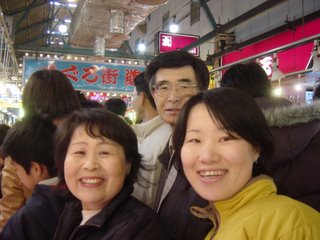
I spent New Year's--a very important and somewhat solemn holiday in Japan--with Mayumi's family in Fujieda. Overall, it was a completely cozy, relaxing, lazy, spiritual, reflective, traditional holiday that I enjoyed very much. Her parents were so sweet and hospitable; her high school buddies were friendly and happy to speak Japanglish with me (their English was quite impressive, but I tried to throw in Japanese whenever I could, so the foreigner wouldn't totally monopolize the language of choice); I ate more rice cakes and home-cooked Japanese food than ever before; I met grandparents and brothers; I rang a temple bell and drank special sake at midnight; I bought very cheap very warm sets of long underwear; I ate my first riceburger (which was actually shrimp and vegetables); I cleaned tombstones and burned incense and prayed; I prayed some more; I watched Japanese dramas from the Edo period; I heard booming fireworks with the rising sun on the first day of the new year; I slept late; and I drank gold-flecked sake with breakfast. Needless to say it was a great welcome to 2006.
I also visited a famous fish market with Mayumi's family. Here are some pics...the orange stuff is a soupy squid mixture, the green stuff is seaweed, and the rest is self-explanatory. Mayumi's favorite treat was miniature octupii (sp?) mixed with wasabi. Uh, please pass the raw tuna with onions and hold the baby alien-wasabi-octupus. Thank you. :)








